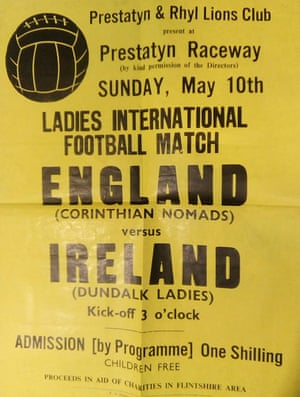[ad_1]
“I was going through my scrapbook and I was looking at photographs from the game and Eusébio had one of the girls on her shoulders, another on top of her, and they were singing their heads off,” reflects Paula Gorham with a laugh. “And they were out there getting trounced!”.
It is 50 years this week since the then 16-year-old Gorham, from a family of 11, took her first trip out of Ireland to play for Dundalk Ladies against Corinthians Nomads from Manchester in a de facto England v Ireland international at Prestatyn Raceway in Wales.
Eusébio was the nickname handed to Stella Clarke, one of a handful of young players to be recruited from the All Stars, in Dublin, into the ranks of Dundalk’s young side – so young in fact that some could not get time off school – to travel to Wales to play the well-established Corinthians.
“I played right full-back and was marking her,” smiles Janice Lyons, who was one of the babies of the Corinthians group at 16. “She was in my pocket for 90 minutes.” There is a hearty cackle in the background, coming from the other participants of this zoom call, a small group of players from the two teams, brought together and hosted by the Football Collective to commemorate the event. Gorham, who would go on to represent the Republic of Ireland 11 times, is wearing her old Dundalk shirt, because “that is how much it means”.
The game, which Corinthians won 7-1 on 10 May 1970, was played on the Raceway because women’s football was still banned from association-affiliated grounds in Wales and became hugely significant for women’s football on both sides of the Irish Sea.
“Dundalk was a founding member of the Women’s FA in 1973, which governed women’s football in England. It was the only club from outside England to be part of that event. Which was quite momentous,” explains Helena Byrne, a librarian who has dedicated much of her free time to researching the history of women’s football in Ireland. “How do a team from Dundalk, of all places, not Dublin, where we’d had more soccer teams, become part of that?”

As far as the limited research is able to show women’s football was not “as popular all over the island as it was in Britain,” says Byrne. “Because Ireland was largely an agricultural society and traditionally soccer is seen as an urban sport.”
There is no evidence to suggest women’s football was ever banned in Ireland as it was elsewhere in the early 1920s. The Belfast-based Irish Football Assocaition and newer Dublin-based Football Association of Ireland spent their energies grappling for jurisdiction over the whole island.
Meanwhile the Republic of Ireland’s Fianna Fáil government brought in legislation that restricted the types of jobs women could apply for. “In 1939 we had the Irish constitution that stated that a women’s place was in the home and the state would endeavour to do all they could to ensure that. That’s still in our constitution,” says Byrne.
In England, women’s football began to grow in industrialised workplaces during the war but, because women were staying at home in Ireland, the sport developed much later. “When youth employment went up in the 1960s and more women started to work they got introduced to the indoor soccer leagues in the workplaces,” says Byrne.
“Every Sunday we would play our league of Ireland games before the Dundalk men’s team and we would only play 30 minutes a side in those days,” recalls Gorham. “Half time, during the gents’ game, we would go around with buckets and tickets and anything else we could find to sell. That’s how we generated our finances.
“To go to Prestatyn we held quiz nights and different events to generate the money together. It was quite expensive, most of us came from big families and our parents couldn’t afford it.”
Playing the Corinthians was an experience. “We were kind of shocked and stunned, because we never lost any of our games at home,” says Gorham. “But the difference in the standards of the Corinthian Nomads and us was massive.”

Byrne says an match report was titled “Ladies beaten but they impress”. She adds: “It’s the top item in the soccer section, ahead of the actual men’s Dundalk side and any other local soccer going on. The 7-1 seems like a thrashing, but actually it’s quite a respectable scoreline because the Corinthians were that good. They would beat other teams 20-0, 15-0, 12-0.”
The Corinthians were a different level. This was the second generation of a team founded in 1949. They would play exhibition matches across the world, which included, in 1957, going abroad, as England, “to play in a European championship and win in Berlin with Bert Trautmann, the famous Manchester City goalkeeper, as their interpreter,” explains Williams. “You cannot overestimate the importance of the Corinthians in post-war women’s football.“
Dr Gary James, author of Manchester City Women: An Oral History, says that “it sort of gets imagined that we jumped from Dick, Kerr Ladies in 1920s to what we have today, without understanding that actually these women that played for Corinthians and for Dundalk really fought against tradition, the establishment and everything else, simply to be able to play football.”
That is all they wanted to do and they did it to a high standard. “I was talking to Lyons recently about the current Manchester City women and she said: ‘Oh, some of the football they play, they’re not as tactically aware as we were,” says James.
Williams adds: “They were so effortlessly better than their opponents that in some games they would play their defenders as forwards and forwards as defenders just to liven things up for themselves. They had wing-backs – it was very sophisticated tactically.”
[ad_2]
Source link